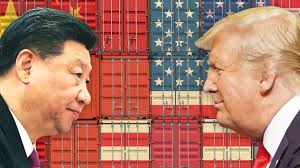As U.S. President Donald Trump’s 10% tariffs on Chinese imports went into effect early Tuesday, Beijing responded with a batch of retaliatory economic measures targeting American companies.
Trump’s tariffs took effect under an executive order issued on Saturday, which accused Beijing of failing to stop fentanyl precursor chemicals from making their way from China to drug cartels that then turn it into the deadly drug that they smuggle into the United States. It also said China had not done enough to shut down money laundering by transnational criminal organizations.
In response, China on Tuesday imposed additional tariffs, introduced export controls on key metals, listed a handful of U.S. companies as Unreliable Entities and launched an anti-monopoly investigation into Google.
China applied a 10% tariff on 72 U.S. exports, including crude oil and various types of farm machinery, such as plows, manure spreaders and harvesters.
A 15% tariff was imposed on eight products, including various coal products and liquified natural gas.
“The unilateral tariff hike by the United States violates the World Trade Organization rules, does nothing to resolve its own issues and disrupts normal economic and trade cooperation between China and the U.S.,” Beijing’s Tax Commission, which announced the tariffs, said in a statement.
Additional tariffs on certain U.S. imported goods will be announced Monday, the statement added.
Meanwhile, Beijing’s Administration of Customs announced export controls on tungsten, tellurium, bismuth, molybdenum and indium — metals important to advanced technologies. The administration cited safeguarding national security and international obligations to non-proliferation as justification for the move.
PVH Group, the parent company of clothing brands such as Tommy Hilfiger and Calvin Klein, along with Illumina, were added to China’s list of so-called unreliable entities. PVH Group had been under investigation in China since September on allegations of refusing to source cotton from its Xinjiang region.
And China’s State Administration for Market Regulation announced an investigation into Google.
“Due to Google’s suspected violation of the anti-monopoly law of the People’s Republic of China, the State Administration for Market Regulation has lawfully initiated an investigation into the company,” it said in a brief statement.
Meanwhile, Trump has issued a one-month pause on the implementation of 25% tariffs on Canada and Mexico, imposed under the same executive order as the China tariffs.
Trump explained the pause was that Canada had agreed to “ensure we have a secure northern border.” He highlighted Ottawa’s December announcement to implement a border plan as part of the reason.
Mexico agreed to supply 10,000 Mexican soldiers on the U.S.-Mexico border.
Both Mexico and Canada had planned retaliatory tariffs against the United States, which are now also on pause.
Economists have been warning that the tariffs could have significant financial consequences for Americans. UPI


